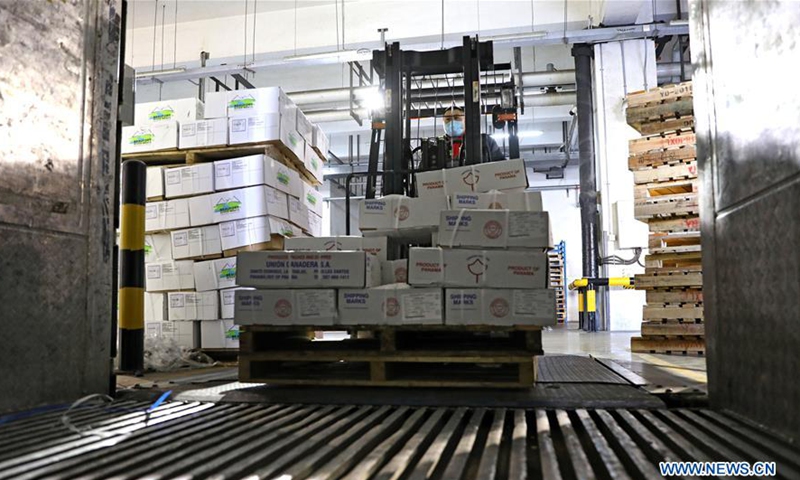UPDATE: Xiamen detects coronavirus on package of frozen pork imported from France
Source: Global Times Published: 2020/11/16 11:01:24

A worker unloads boxes of imported frozen meat at a cold storage at Dalian port in Dalian, northeast China's Liaoning Province, April 8, 2020. Since it resumed operation, the port has streamlined its cold chain operation attempting to achieve greater efficiency. (Xinhua/Yao Jianfeng)
Xiamen, East China's Fujian Province, on Sunday detected the COVID-19 virus on one outer packaging of 25 tons of frozen pork imported from France. The pork entered China from Shanghai and has not been sold in markets.
The local CDC found that none of the batch of frozen pork had been used or entered the market since arriving at a cold storage facility in Xiamen on Saturday.
Local authorities responded by launching emergency plans, closing the pork cold storage facility, promptly sealing up the products, and disinfecting and controlling the storage and the surrounding environment.
In addition, the related personnel working in the cold-chain sector have gone into centralized quarantine for medical observation and nucleic acid testing, and authorities have expanded nucleic acid testing of samples from the cold storage facility and surrounding environment.
According to the results, all personnel and environmental samples have tested negative for COVID-19.
China has heightened inspections of imported frozen food to prevent a resurgence of COVID-19.
A new guideline released by the Ministry of Transport requires that logistics companies, ports and freight venues in the cold-chain food sector thoroughly carry out disinfection work, media reported on Monday.
Shanghai on Sunday requested local related authorities to check the nucleic acid testing and disinfection certification of cold-chain foods entering the city. City authorities said that starting from Monday, cold-chain food imported from high-risk areas should enter transit inspection warehouses for nucleic acid testing and outer packing disinfection.
China is now requiring imported cold-chain food to be thoroughly disinfected before going to market, after live coronavirus was detected on the outer packaging of imported cold-chain food in several cities in the country, leading to growing public concerns.
Global Times
RELATED ARTICLES:
Posted in: SOCIETY